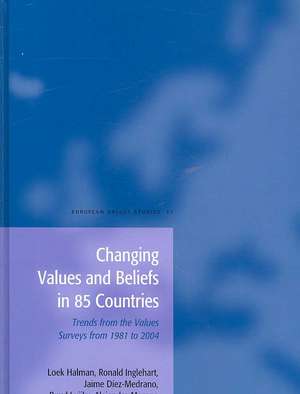Changing Values and Beliefs in 85 Countries: Trends from the Values Surveys from 1981 to 2004: European Values Studies, cartea 11
Editat de Loek Halman, Ronald L. Inglehart, Jaime Díez-Medrano, Ruud Luijkx, Alejandro Moreno, Miguel Basáñezen Limba Engleză Hardback – 12 noi 2007
Preț: 576.68 lei
Preț vechi: 703.27 lei
-18% Nou
Puncte Express: 865
Preț estimativ în valută:
110.34€ • 115.21$ • 91.33£
110.34€ • 115.21$ • 91.33£
Carte indisponibilă temporar
Doresc să fiu notificat când acest titlu va fi disponibil:
Se trimite...
Preluare comenzi: 021 569.72.76
Specificații
ISBN-13: 9789004157781
ISBN-10: 9004157786
Pagini: 266
Dimensiuni: 210 x 297 x 23 mm
Greutate: 1.09 kg
Editura: Brill
Colecția Brill
Seria European Values Studies
ISBN-10: 9004157786
Pagini: 266
Dimensiuni: 210 x 297 x 23 mm
Greutate: 1.09 kg
Editura: Brill
Colecția Brill
Seria European Values Studies
Public țintă
All those interested in the cultural patterns of contemporary societies and the varieties and diversities in value patterns and cultural trends, journalists, business executives, politicians, decision takers and policy-makers.Notă biografică
Loek
Halman,
Ph.D.
(1991),
Tilburg
University,
is
Associate
Professor
of
Sociology
at
the
Department
of
Social
Cultural
Sciences
at
the
Faculty
of
Social
and
Behavioral
Sciences
at
Tilburg
University.
He
is
general
secretary
to
the
European
Values
Study
Foundation
and
Program
Director
of
the
European
Values
Study.
His
research
deals
with
issues
of
modernization,
individualization,
and
secularization
of
(Western)
societies,
attitudes
and
values.
Ronald Inglehart, Ph.D. (1967), University of Chicago, is professor of political science and program director at the Institute for Social Research at the University of Michigan. He helped found the Euro-Barometer surveys and directs the World Values Survey. His research deals with changing belief systems and their impact on social and political change.
Jaime Díez-Medrano, Eng. (1987), Universidad Politécnica de Madrid, is the president of JD Systems, director of the ASEP/JDS Archive and responsible of the World Values Survey data cleaning since 2000. He participated in the construction of the WVS1995 and WVS2000 official files and the construction of the four wave EVS/WVS aggregate. He is expert in data dissemination.
Ruud Luijkx, Ph.D. (1994), Tilburg University, is Lecturer of Sociology at Tilburg University, the Netherlands, and data manager for the European Values Study. He is co-responsible for the construction of the 1981-2004 EVS/WVS aggregate file. He has published on inter- and intragenerational social mobility, social inequality and stratification, the dynamics of value change and on categorical data analysis.
Alejandro Moreno, Ph.D.(1997), University of Michigan, Ann Arbor, is professor of political science at the Instituto Tecnologico Autonomo de Mexico (ITAM), and head of the department of surveys at newspaper Reforma, both in Mexico City. His main publications and current research deal with public opinion, voting behavior, and political values in Mexico and other new democracies.Miguel Basáñez, Ph.D. (1990), London School of Economics, is president of Global Quality Research Corp, an international survey research firm based in Princeton, NJ, USA. He helped found the Latin-Barometer (1995) and the Asia-Barometer (2004) and is member of the World Values Survey’s Steering Committee. His research deals with changing belief systems and their impact on social and political change.
Ronald Inglehart, Ph.D. (1967), University of Chicago, is professor of political science and program director at the Institute for Social Research at the University of Michigan. He helped found the Euro-Barometer surveys and directs the World Values Survey. His research deals with changing belief systems and their impact on social and political change.
Jaime Díez-Medrano, Eng. (1987), Universidad Politécnica de Madrid, is the president of JD Systems, director of the ASEP/JDS Archive and responsible of the World Values Survey data cleaning since 2000. He participated in the construction of the WVS1995 and WVS2000 official files and the construction of the four wave EVS/WVS aggregate. He is expert in data dissemination.
Ruud Luijkx, Ph.D. (1994), Tilburg University, is Lecturer of Sociology at Tilburg University, the Netherlands, and data manager for the European Values Study. He is co-responsible for the construction of the 1981-2004 EVS/WVS aggregate file. He has published on inter- and intragenerational social mobility, social inequality and stratification, the dynamics of value change and on categorical data analysis.
Alejandro Moreno, Ph.D.(1997), University of Michigan, Ann Arbor, is professor of political science at the Instituto Tecnologico Autonomo de Mexico (ITAM), and head of the department of surveys at newspaper Reforma, both in Mexico City. His main publications and current research deal with public opinion, voting behavior, and political values in Mexico and other new democracies.Miguel Basáñez, Ph.D. (1990), London School of Economics, is president of Global Quality Research Corp, an international survey research firm based in Princeton, NJ, USA. He helped found the Latin-Barometer (1995) and the Asia-Barometer (2004) and is member of the World Values Survey’s Steering Committee. His research deals with changing belief systems and their impact on social and political change.
Descriere
This
book
presents
the
trends
in
beliefs
and
values
of
people
in
85
countries
around
the
world
from
1981
to
2004.
Based
on
survey
data
collected
in
1981-1984
and
1989-1993
by
the
European
Values
Study,
the
1995-1997
World
Values
Surveys
and
the
1999-2004
European
Values
Study
and
World
Values
Surveys,
it
examines
trends
in
human
values
concerning
economics,
politics,
religion,
family,
gender
roles,
civic
engagement
and
ethical
concerns
and
important
contemporary
issues
such
as
the
environment,
technology,
identity,
life
satisfaction
and
human
happiness.
It
is
a
valuable
tool
for
understanding
the
cultural
patterns
of
countries
and
how
human
values
are
changing.
It
will
be
useful
to
social
scientists,
journalists,
business
executives,
politicians
and
policy-makers
working
in
an
increasingly
globalized
world.













